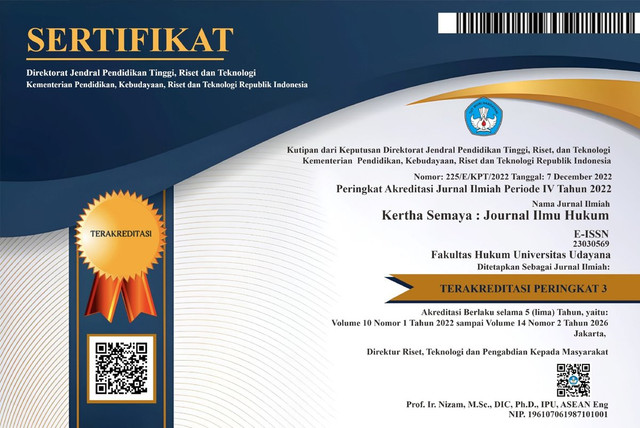EFEKTIVITAS LEMBAGA MANAJEMEN KOLEKTIF NASIONAL DALAM PERLINDUNGAN HAK EKONOMI PENCIPTA LAGU DI ERA DIGITAL DI INDONESIA
DOI:
https://doi.org/10.24843/KS.2025.v13.i09.p19Keywords:
Hak Cipta, Royalti, Perlindungan Hukum, Era DigitalAbstract
Penelitian ini bertujuan untuk menelaah efektivitas Lembaga Manajemen Kolektif Nasional (LMKN) dalam memberikan perlindungan terhadap hak ekonomi pencipta lagu di era digital. LMKN dibentuk berdasarkan Undang-Undang Nomor 28 Tahun 2014 tentang Hak Cipta sebagai lembaga negara nonstruktural yang berfungsi untuk menarik, menghimpun, dan mendistribusikan royalti kepada pencipta dan pemegang hak terkait. Namun, dalam praktiknya, LMKN menghadapi berbagai kendala, seperti keterbatasan regulasi teknis, kurangnya transparansi, serta belum optimalnya sistem digital dalam pendistribusian royalti. Penelitian ini menggunakan metode yuridis normatif dengan pendekatan perundang-undangan, konsep, dan kasus. Hasil penelitian menunjukkan bahwa efektivitas LMKN dalam melindungi hak ekonomi pencipta masih belum maksimal, terutama karena belum adanya integrasi sistem digital dan kelemahan koordinasi antar-LMK. Untuk meningkatkan efektivitasnya, diperlukan revisi regulasi dan penerapan sistem digital terpusat yang mampu menjamin transparansi dan kepastian hukum bagi semua pihak.
This research aims to examine the effectiveness of the National Collective Management Organization (LMKN) in protecting the economic rights of songwriters in the digital era. LMKN was established under Law Number 28 of 2014 concerning Copyright as a non-structural state institution tasked with collecting and distributing royalties to authors and related rights holders. However, in practice, LMKN faces several challenges, including limited technical regulations, lack of transparency, and the absence of an integrated digital system for royalty distribution. Using a normative juridical method with statutory, conceptual, and case approaches, this study finds that LMKN’s effectiveness remains suboptimal. The main issues stem from regulatory ambiguity and weak coordination among collective management organizations. Strengthening LMKN’s role requires regulatory reform and the implementation of a centralized digital database to ensure transparency and legal certainty for both creators and users.
Downloads
Published
How to Cite
Issue
Section
License
Copyright (c) 2025 Constantius Mario Valentino Mbaling, Wilma Silalahi

This work is licensed under a Creative Commons Attribution-NonCommercial-ShareAlike 4.0 International License.



